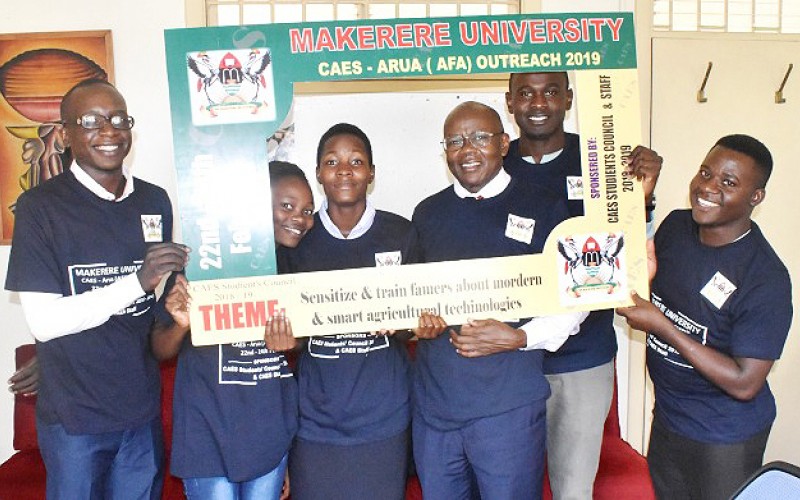
The Principal CAES, Prof. Bernard Bashaasha (3rd R) poses with a group of students at the flagoff ceremony on Thurday 21st February 2019, Makerere University, Kampala Uganda
Over 30 students from Makerere University College of Agricultural and Environmental Sciences (CAES) under the student leadership were on 21st February, 2019 flagged off to Arua District for an outreach program to sensitize and train farmers about modern technologies in Climate Smart Agriculture.
The students were flagged off by the Principal CAES Prof. Bernard Bashaasha, the College Registrar Mr. Obura Edward and the Team Leader Ms. Vianney Baguma for the three-day activity (22nd-24th February, 2019).

The outreach was sponsored by the CAES Students’ Council and the college staff at an estimated budget of UGX11million.
The students President Ms. Hajara Nantume said the overall objective of the outreach was to engage with community leaders on possible ways of establishing a university field centre for dissemination of new, improved or modern agricultural techniques in Arua region.

“The theme of this outreach is to sensitize and train farmers about modern in climate smart agriculture. In a bid to extend our knowledge to the people of Arua, groups of students from the different courses developed different subthemes to train farmers on such as; Soil fertility management and organic farming, Agro forestry, Nutrition assessment and education, Post-harvest handling and Value addition and marketing,” Ms. Hajara explained.
The students’ Publicity Secretary Mr. Martin Kasirye noted that Arua is one of the rural areas in Uganda that is experiencing livelihood challenges of food insecurity, poverty and unemployment due to uncertain weather conditions, which have discouraged farming.

He stressed that there is a potential of harnessing the capacity of the farmers from Arua, in order to advance development through job creation and promoting food security by disseminating climate smart agricultural techniques to enhance adoption and increase resilience to climate change.
“This can be possible by creating a venue for spreading modern organic and weather independent techniques to small holder farmers through demonstrations during the training.

The community is mostly relying indigenous information systems to cope with the changing climate because they have little access to climate smart agriculture technical knowledge, making them continuously experience weather-related stress in farming,”. Martin narrated.
With an outreach program and establishment of a university field site, propagation and dissemination of new modern farming techniques, agriculture students hope it can be possible to make communities in Arua aware of the methods which can help them to overcome losses associated with traditional farming methods.

“It will also help farmers to adjust from the already failing traditional farming systems to new and modern farming systems which are independent of weather conditions. Through use of environment independent farming systems, the challenge of weather related crop farming in the region will be overcome and this shall attract more investments in agriculture by farmers,” one of the students noted.
Like Arua, most communities in Uganda derive their livelihood from agriculture and are vulnerable to weather-related stress and climate change. There is vulnerability of communities due to shortage of food in terms of quality and quantity, inadequate access to safe water, extreme dry spells and flooding of water sources among others. The need for farmers to adopt Climate Smart Agricultural technologies through creating awareness of practical modern farming techniques is one of the possible means to enhance sustainable food production while boosting income and improving livelihood.
Article compiled by:
Jane Anyango,
Principal Communication Officer, CAES

